Ökonometrische Methoden für wirtschaftliche Prognosen und Simulationen
Der Forschungsschwerpunkt der Forschungsgruppe liegt in der Entwicklung ökonometrischer Methoden für Kurzfristprognosen (Reduzierte-Form-Modelle), für Regionalisierung und für Langfristprojektionen sowie für strukturelle Prognose- und Simulationsmodelle (DSGE-Modelle). Ferner erstellt sie ökonometrische Hintergrundanalysen für die Prognosetätigkeit der Forschungsgruppe Makroökonomische Analysen und Prognosen. Im Rahmen von Drittmittelprojekten wurden verschiedene makroökonomische Modelle, bspw. für die Volkswagen Financial Services AG oder im Rahmen von GIZ-Projekten für die Wirtschaftsministerien in Kirgistan und Tadschikistan sowie das Institut für makroökonomische Prognosen und Forschung (IFMR) in Usbekistan entwickelt.
IWH-Datenprojekt: IWH Real-time Database
Forschungscluster
Wirtschaftliche Dynamik und StabilitätIhr Kontakt
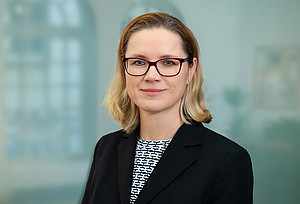
- Abteilung Makroökonomik
PROJEKTE
07.2022 ‐ 12.2026
Evaluierung des InvKG und des Bundesprogrammes STARK
Bundesministerium für Wirtschaft und Klimaschutz (BMWK)
Im Auftrag des Bundesministeriums für Wirtschaft und Klimaschutz evaluieren das IWH und das RWI die Verwendung der rund 40 Milliarden Euro, mit denen der Bund die Kohleausstiegsregionen unterstützt.
12.2024 ‐ 02.2026
Macroeconomic Modelling for Energy Investments in Vietnam
Deutsche Gesellschaft für Internationale Zusammenarbeit (GIZ) GmbH
08.2024 ‐ 03.2025
Strengthening Public Financial Management in Vietnam
Deutsche Gesellschaft für Internationale Zusammenarbeit (GIZ) GmbH
01.2023 ‐ 12.2023
Frühzeitige Ermittlung stabiler Ergebnisse zum Bruttoinlandsprodukt bzw. realen Wirtschaftswachstum und der Bruttowertschöpfung auf Länderebene
Landesbetrieb Information und Technik Nordrhein-Westfalen
Das Projekt prüft, ob die Genauigkeit der ersten Schätzung der Bruttowertschöpfung und des Bruttoinlandsprodukts für die Bundesländer erhöht und damit das Ausmaß der nachfolgenden Revisionen reduziert werden kann.
01.2018 ‐ 12.2023
EuropeAid (EU-Rahmenvertrag)
Europäische Kommission
05.2020 ‐ 09.2023
ENTRANCES: Energy Transitions from Coal and Carbon: Effects on Societies
Europäische Kommission
Ziel von ENTRANCES ist es, die Folgen des Kohleausstiegs in Europa zu untersuchen. Wie verändert der Kohleausstieg die Gesellschaft – und wie kann Politik darauf reagieren?
This project has received funding from the European Union’s Horizon 2020 research and innovation programme under grant agreement No 883947.
10.2019 ‐ 01.2023
An Klimawandel angepasste Wirtschaftsentwicklung
Deutsche Gesellschaft für Internationale Zusammenarbeit (GIZ) GmbH
Der Klimawandel wirkt sich stark auf das Wirtschaftswachstum und die Entwicklung eines Landes aus. Das erhöht den Bedarf an verlässlichen und realisierbaren Ansätzen, mit denen die Auswirkungen von Klimarisiken und potenzielle Anpassungsszenarien bewertet werden können. Die politischen Entscheidungsträger*innen in den Planungs- und Wirtschaftsministerien benötigen fundierte Prognosen, um entsprechende wirtschaftspolitische Instrumente zu konzipieren, zu finanzieren und aktiv gegenzusteuern. In den Pilotländern Kasachstan, Vietnam und Georgien werden Klimarisiken bei der makroökonomischen Modellierung berücksichtigt. Die Ergebnisse werden so in den Politikprozess integriert, dass angepasste Wirtschaftsplanungen entstehen können. Das IWH-Team ist verantwortlich für die makroökonomische Modellierung in Vietnam.
07.2016 ‐ 12.2018
Klimaschutz und Kohleausstieg: Politische Strategien und Maßnahmen bis 2030 und darüber hinaus
Umweltbundesamt (UBA)
01.2017 ‐ 12.2017
Unterstützung einer nachhaltigen Wirtschaftsentwicklung in ausgewählten Regionen Usbekistans
Deutsche Gesellschaft für Internationale Zusammenarbeit (GIZ) GmbH
01.2017 ‐ 12.2017
Short-term Macroeconomic Forecasting Model in Ministry of Economic Development and Trade of Ukraine
Deutsche Gesellschaft für Internationale Zusammenarbeit (GIZ) GmbH
01.2016 ‐ 12.2017
Entwicklung eines analytischen Tools basierend auf einer Input-Output-Tabelle
Deutsche Gesellschaft für Internationale Zusammenarbeit (GIZ) GmbH
Das Ziel des Projektes war die Entwicklung eines Exceltools zur Wirkungsanalyse von Politikmaßnahmen in Tadschikistan basierend auf dem statischen Input-Output-Ansatz.
11.2015 ‐ 12.2016
Beschäftigung und Entwicklung in der Republik Usbekistan
Deutsche Gesellschaft für Internationale Zusammenarbeit (GIZ) GmbH
Förderung einer nachhaltigen wirtschaftlichen Entwicklung in ausgewählten Regionen Usbekistans
05.2016 ‐ 05.2016
Rahmenbedingungen und Finanzierungsmöglichkeiten für die Entwicklung des Privatsektors in Tadschikistan
Deutsche Gesellschaft für Internationale Zusammenarbeit (GIZ) GmbH
02.2016 ‐ 04.2016
Makroökonomische Reformen und umwelt- und sozialverträgliches Wachstum in Vietnam
Deutsche Gesellschaft für Internationale Zusammenarbeit (GIZ) GmbH
10.2015 ‐ 03.2016
Improved Evidence-based Policy Making - GIZ Tadschikistan
Deutsche Gesellschaft für Internationale Zusammenarbeit (GIZ) GmbH
Referierte Publikationen

Effects of Incorrect Specification on the Finite Sample Properties of Full and Limited Information Estimators in DSGE Models
in: Journal of Macroeconomics, June 2016
Abstract
In this paper we analyze the small sample properties of full information and limited information estimators in a potentially misspecified DSGE model. Therefore, we conduct a simulation study based on a standard New Keynesian model including price and wage rigidities. We then study the effects of omitted variable problems on the structural parameter estimates of the model. We find that FIML performs superior when the model is correctly specified. In cases where some of the model characteristics are omitted, the performance of FIML is highly unreliable, whereas GMM estimates remain approximately unbiased and significance tests are mostly reliable.

Testing for Structural Breaks at Unknown Time: A Steeplechase
in: Computational Economics, Nr. 1, 2013
Abstract
This paper analyzes the role of common data problems when identifying structural breaks in small samples. Most notably, we survey small sample properties of the most commonly applied endogenous break tests developed by Brown et al. (J R Stat Soc B 37:149–163, 1975) and Zeileis (Stat Pap 45(1):123–131, 2004), Nyblom (J Am Stat Assoc 84(405):223–230, 1989) and Hansen (J Policy Model 14(4):517–533, 1992), and Andrews et al. (J Econ 70(1):9–38, 1996). Power and size properties are derived using Monte Carlo simulations. We find that the Nyblom test is on par with the commonly used F type tests in a small sample in terms of power. While the Nyblom test’s power decreases if the structural break occurs close to the margin of the sample, it proves far more robust to nonnormal distributions of the error term that are found to matter strongly in small samples although being irrelevant asymptotically for all tests that are analyzed in this paper.

Fiscal Spending Multiplier Calculations Based on Input-Output Tables? An Application to EU Member States
in: Intervention. European Journal of Economics and Economic Policies, Nr. 1, 2012
Abstract
Fiscal spending multiplier calculations have attracted considerable attention in the aftermath of the global financial crisis. Much of the current literature is based on VAR estimation methods and DSGE models. In line with the Keynesian literature we argue that many of these models probably underestimate the fiscal spending multiplier in recessions. The income-expenditure model of the fiscal spending multiplier can be seen as a good approximation under these circumstances. In its conventional form this model suffers from an underestimation of the multiplier due to an overestimation of the import intake of domestic absorption. In this article we apply input-output calculus to solve this problem. Multipliers thus derived are comparably high, ranging between 1.4 and 1.8 for many member states of the European Union. GDP drops due to budget consolidation might therefore be substantial in times of crisis.

The Halle Economic Projection Model
in: Economic Modelling, Nr. 4, 2012
Abstract
In this paper we develop an open economy model explaining the joint determination of output, inflation, interest rates, unemployment and the exchange rate in a multi-country framework. Our model -- the Halle Economic Projection Model (HEPM) -- is closely related to studies published by Carabenciov et al. Our main contribution is that we model the Euro area countries separately. In doing so, we consider Germany, France, and Italy which represent together about 70 percent of Euro area GDP. The model combines core equations of the New-Keynesian standard DSGE model with empirically useful ad-hoc equations. We estimate this model using Bayesian techniques and evaluate the forecasting properties. Additionally, we provide an impulse response analysis and a historical shock decomposition.

The Performance of Short-term Forecasts of the German Economy before and during the 2008/2009 Recession
in: International Journal of Forecasting, Nr. 2, 2012
Abstract
The paper analyzes the forecasting performance of leading indicators for industrial production in Germany. We focus on single and pooled leading indicator models both before and during the financial crisis. Pairwise and joint significant tests are used to evaluate single indicator models as well as forecast combination methods. In addition, we investigate the stability of forecasting models during the most recent financial crisis.
Arbeitspapiere

Conditional Macroeconomic Forecasts: Disagreement, Revisions and Forecast Errors
in: IWH Discussion Papers, Nr. 7, 2021
Abstract
Using data from the European Central Bank‘s Survey of Professional Forecasters, we analyse the role of ex-ante conditioning variables for macroeconomic forecasts. In particular, we test to which extent the heterogeneity, updating and ex-post performance of predictions for inflation, real GDP growth and the unemployment rate are related to assumptions about future oil prices, exchange rates, interest rates and wage growth. Our findings indicate that inflation forecasts are closely associated with oil price expectations, whereas expected interest rates are used primarily to predict output growth and unemployment. Expectations about exchange rates and wage growth also matter for macroeconomic forecasts, albeit less so than oil prices and interest rates. We show that survey participants can considerably improve forecast accuracy for macroeconomic outcomes by reducing prediction errors for external conditions. Our results contribute to a better understanding of the expectation formation process of experts.
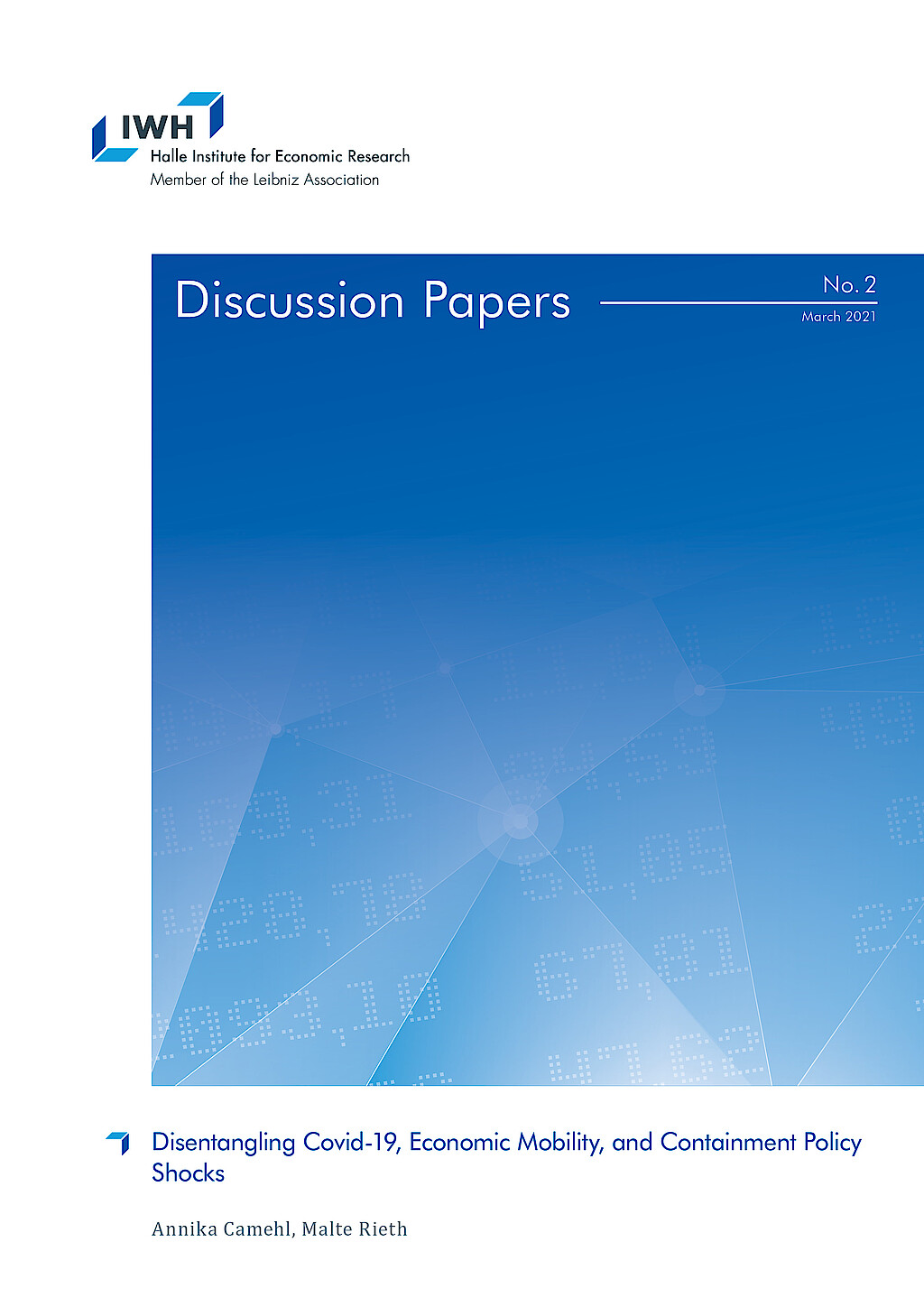
Disentangling Covid-19, Economic Mobility, and Containment Policy Shocks
in: IWH Discussion Papers, Nr. 2, 2021
Abstract
We study the dynamic impact of Covid-19, economic mobility, and containment policy shocks. We use Bayesian panel structural vector autoregressions with daily data for 44 countries, identified through sign and zero restrictions. Incidence and mobility shocks raise cases and deaths significantly for two months. Restrictive policy shocks lower mobility immediately, cases after one week, and deaths after three weeks. Non-pharmaceutical interventions explain half of the variation in mobility, cases, and deaths worldwide. These flattened the pandemic curve, while deepening the global mobility recession. The policy tradeoff is 1 p.p. less mobility per day for 9% fewer deaths after two months.
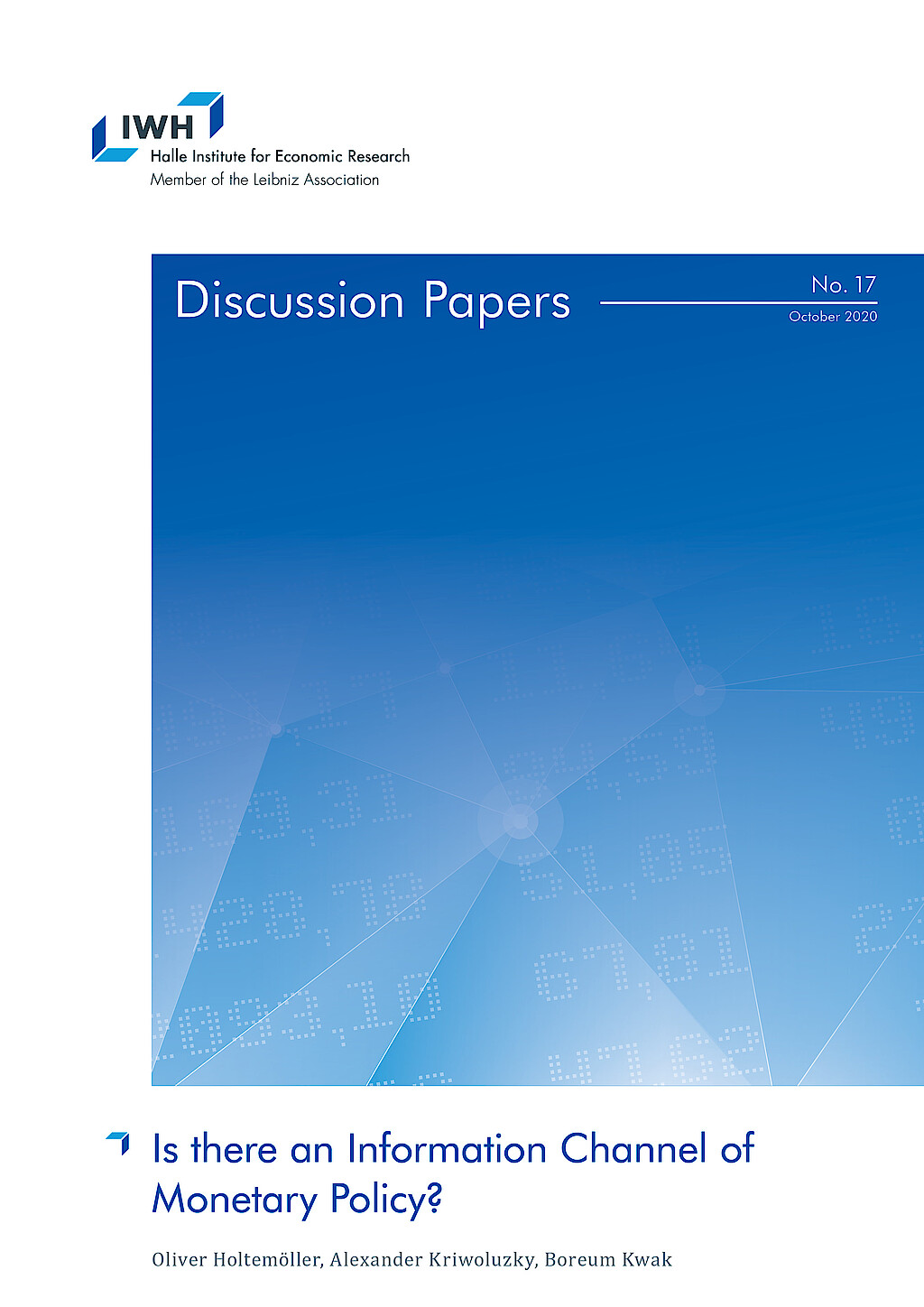
Is there an Information Channel of Monetary Policy?
in: IWH Discussion Papers, Nr. 17, 2020
Abstract
Exploiting the heteroscedasticity of the changes in short-term and long-term interest rates and exchange rates around the FOMC announcement, we identify three structural monetary policy shocks. We eliminate the predictable part of the shocks and study their effects on financial variables and macro variables. The first shock resembles a conventional monetary policy shock, and the second resembles an unconventional monetary shock. The third shock leads to an increase in interest rates, stock prices, industrial production, consumer prices, and commodity prices. At the same time, the excess bond premium and uncertainty decrease, and the U.S. dollar depreciates. Therefore, this third shock combines all the characteristics of a central bank information shock.
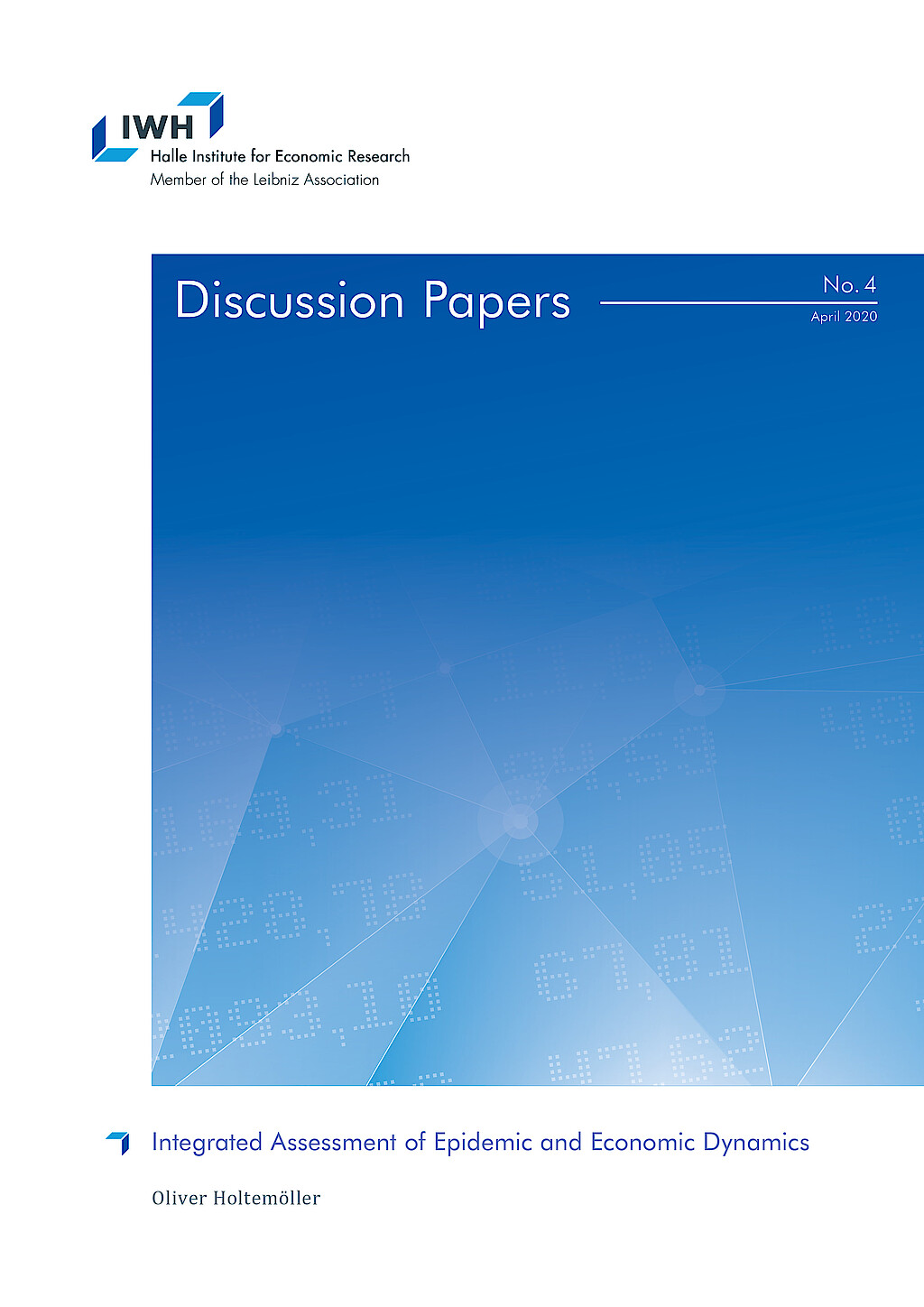
Integrated Assessment of Epidemic and Economic Dynamics
in: IWH Discussion Papers, Nr. 4, 2020
Abstract
In this paper, a simple integrated model for the joint assessment of epidemic and economic dynamics is developed. The model can be used to discuss mitigation policies like shutdown and testing. Since epidemics cause output losses due to a reduced labor force, temporarily reducing economic activity in order to prevent future losses can be welfare enhancing. Mitigation policies help to keep the number of people requiring intensive medical care below the capacity of the health system. The optimal policy is a mixture of temporary partial shutdown and intensive testing and isolation of infectious persons for an extended period of time.
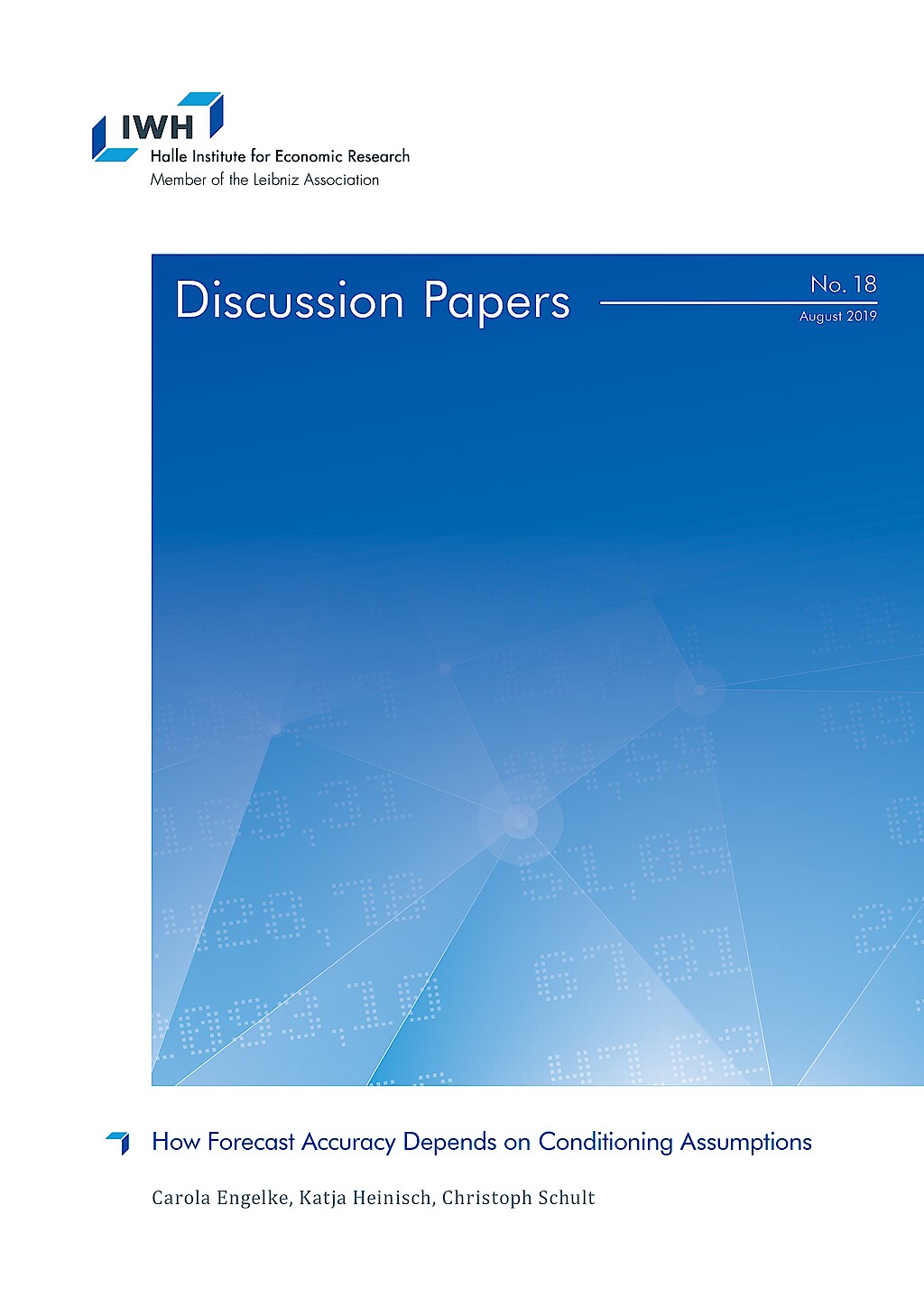
How Forecast Accuracy Depends on Conditioning Assumptions
in: IWH Discussion Papers, Nr. 18, 2019
Abstract
This paper examines the extent to which errors in economic forecasts are driven by initial assumptions that prove to be incorrect ex post. Therefore, we construct a new data set comprising an unbalanced panel of annual forecasts from different institutions forecasting German GDP and the underlying assumptions. We explicitly control for different forecast horizons to proxy the information available at the release date. Over 75% of squared errors of the GDP forecast comove with the squared errors in their underlying assumptions. The root mean squared forecast error for GDP in our regression sample of 1.52% could be reduced to 1.13% by setting all assumption errors to zero. This implies that the accuracy of the assumptions is of great importance and that forecasters should reveal the framework of their assumptions in order to obtain useful policy recommendations based on economic forecasts.


























